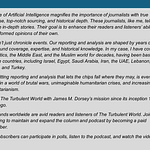James discusses the prospects of US President Donald Trump’s Gaza proposal on Radio Islam.
To listen to the Radio Islam podcast, go to
[Anchor] James, a very good morning to you and welcome. It’s a pleasure to be with you. I look forward to our weekly chats.
So do I. It took barely 24 hours for US President Donald Trump’s Gaza proposal to fray at the edges with Israel and Hamas selling allegations of ceasefire violations at one another.
[James M. Dorsey] Indeed, so what this shows is the deep degree of distrust between Hamas and Israel, which is no surprise of course, and the fact that both Hamas and Israel are pursuing very different objectives and motives in agreeing to the Trump proposal for an end to the Gaa war.
Essentially, the Israelis are accusing the Hamas of not releasing the bodies of the deceased captives deliberately rather than because of the practical problems involved. Even though the Israelis knew going into this that it would be difficult because of the degree of devastation that they have rained on Gaza, it would be difficult to find all of the remains of the dead captives under the rubble in Gaza.
Paired with that is the fact that Israel essentially has agreed only to the first phase of the Trump proposal, that is a ceasefire that would allow for an exchange of prisoners. Hamas held captives for Palestinians incarcerated in Israel and Hamas sees this as really withdrawal from the Gaza Strip to which the Israelis haven’t really committed as such, and of course a permanent end to the war. And you’re seeing that play out on the ground in Gaza with the Israelis still striking targets and Hamas trying to brutally, for that matter, reassert its authority and control in the Strip.
[Anchor] Even so, the hostage issue may in retrospect prove to be the easy bet, James.
[James M. Dorsey] Absolutely. Despite all the complications that we’re seeing in that prisoner exchange phase of the Trump plan, the rest of it is much more complicated and nothing is agreed.
So, with other words, who’s going to administer Gaza? Is there going to be an international stabilisation force? What will be the mandate of that and the rules of engagement of that stabilisation force?
What is the end goal here? Is that depopulation of Gaza? Is that trying to improve the economic and social circumstances of Gazans, or is it a Palestinian state?
Trump may think that this is all done and dusted. Fact of the matter is nothing is done and dusted, and these are going to be very complex negotiations, if they’re going to be negotiations at all.
[Anchor] Now the vagueness of the Trump proposal has shaped Palestinian, Arab and Muslim buy-in into what is a set of post-war principles and objectives, with no terms or mechanism for implementation. At the same time, it offers proponents of Palestinian national rights an opportunity to fill the vacuum.
[James M. Dorsey] Indeed, so essentially what we’ve seen is that Arab and Muslim states have a degree of leverage, particularly with Donald Trump. What we’ve also seen is that everybody, Arabs, Israelis, Palestinians, Muslims, have bought into this plan, not because they agree to all of its provisions or principles, but because Trump is the only game in town at this point, and nobody for multiple reasons of their own wants to get on the wrong side of Donald Trump.
Now that is where there’s opportunity.
So ,for example, if the Palestinians, the Arabs, the Muslims would insist that for this to work, the United States and the Trump administration has to commit to the creation of a Palestinian state, that implementation of the proposal, and the proposal itself is anchored in international law by having the United Nations Security Council, for example, endorse it steps in which the Palestinians, the Arabs, and Muslims can shape this process, or at least sincerely attempt to shape the process, which they have yet to take.
Those are steps which they have yet to take, or opportunities that they have to grab head on.
[Anchor]
So James, the need for a proactive Palestinian, Arab, and Muslim effort is compounded by widely varying perceptions of what it would take to turn Gaza into a springboard for a potentially sustainable resolution to the Israeli-Palestinian issue. I
[James M. Dorsey] Indeed. So essentially, you have two very fundamentally different concepts of what the end game is. The end game for the Palestinians, for Arab states, for Muslim-majority states, is the creation of an independent Palestinian state as the end of the Israeli-Palestinian conflict. For the Trump administration and for Israel, this is an economic approach.
With other words, much like we had with the deal of the century in the first Trump administration. When Trump this week left Sharm el-Sheikh, where he had this summit of European and Arab and Muslim leaders, and the Egyptian co-host, Abdel Fattah al-Sisi, the president of Egypt, talked about a Palestinian state, Trump said, we’re talking about very different plans. My plan is the economic reconstruction of Gaza.
With other words, the approach of a real estate magnet. And that is the field of tension, if you wish, in which Palestinians, Arabs, and Muslims could start to at least attempt to shape the process and use their leverage.
[Anchor]
All right, James, as always, thank you so much for your time, and we look forward to chatting to you next week. It’s always a pleasure. Thank you.










